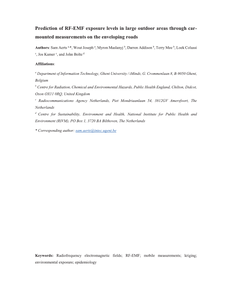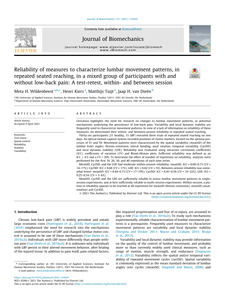This article examines internal organizational factors and external antecedents of sus-tainable value creation by small medium enterprises (SMEs) and constructs a frame-work that integrates, at both levels, the theories of psychological distance andconstrual level from the field of psychology. This research provides an explanation asto why sustainable value creation remains a complex issue, and why many SMEs'engage with sustainable value creation to varying degrees. This paper particularlyhighlights how owner/managers of SME may construe different dimensions of psy-chological distance and apply their understanding to their response to different ante-cedents of sustainable value creation. Finally, by adopting the psychological distanceperspective, this paper highlights the conditions under which internal and externalorganizational and factors can affect SMEs' propensity to create sustainable value. Itfurther concludes by highlighting areas for further research
LINK
This study evaluates the maximum theoretical exposure to radiofrequency (RF) electromag- netic fields (EMFs) from a Fifth-generation (5G) New Radio (NR) base station (BS) while using four commonly used mobile applications: YouTube for video streaming, WhatsApp for voice calls, Instagram for posting pictures and videos, and running a Video game. Three factors that might affect exposure, i.e., distance of the measurement positions from the BS, measurement time, and induced traffic, were examined. Exposure was assessed through both instantaneous and time-averaged extrapolated field strengths using the Maximum Power Extrapolation (MPE) method. The former was calculated for every measured SS-RSRP (Secondary Synchronization Reference Signal Received Power) power sample obtained with a sampling resolution of 1 second, whereas the latter was obtained using a 1-min moving average applied on the applications’ instantaneous extrapolated field strengths datasets. Regarding distance, two measurement positions (MPs) were selected: MP1 at 56 meters and MP2 at 170 meters. Next, considering the measurement time, all mobile application tests were initially set to run for 30 minutes at both MPs, whereas the video streaming test (YouTube) was run for an additional 150 minutes to investigate the temporal evolution of field strengths. Considering the traffic, throughput data vs. both instantaneous and time-averaged extrapolated field strengths were observed for all four mobile applications. In addition, at MP1, a 30-minute test without a User Equipment (UE) device was conducted to analyze exposure levels in the absence of induced traffic. The findings indicated that the estimated field strengths for mobile applications varied. It was observed that distance and time had a more significant impact than the volume of data traffic generated (throughput). Notably, the exposure levels in all tests were considerably lower than the public exposure thresholds set by the ICNIRP guidelines.INDEX TERMS 5G NR, C-band, human exposure assessment, mobile applications, traffic data, maximum extrapolation method, RF-EMF.
MULTIFILE

This paper compares different low-cost sensors that can measure (5G) RF-EMF exposure. The sensors are either commercially available (off-the-shelf Software Defined Radio (SDR) Adalm Pluto) or constructed by a research institution (i.e., imec-WAVES, Ghent University and Smart Sensor Systems research group (S3R), The Hague University of Applied Sciences). Both in-lab (GTEM cell) and in-situ measurements have been performed for this comparison. The in-lab measurements tested the linearity and sensitivity, which can then be used to calibrate the sensors. The in-situ testing confirmed that the low-cost hardware sensors and SDR can be used to assess the RF-EMF radiation. The variability between the sensors was 1.78 dB on average, with a maximum deviation of 5.26 dB. Values between 0.09 V/m and 2.44 V/m were obtained at a distance of about 50 m from the base station. These devices can be used to provide the general public and governments with temporal and spatial 5G electromagnetic field values.
DOCUMENT

The availability of time has played a pivotal role in the analysis of tourism. An examination of social theory and time suggests that tourists experience time in multiple ways, which has implications for the traditional temporal and spatial reference frame. This article calls for a better understanding of 'time' in tourism and sets the agenda for further research into time and the sustainable development of tourism. It analyses the role of time in shaping tourism consumption and illustrates the challenges posed by new temporal understandings and distance concepts to create less greenhouse-gas-dependent tourism in our society.
LINK
The capacity to deal with digital transformation is a valuable asset for established organizations, and employees play a crucial role in this process. This study contributes to the understanding of employees’ sensemaking of digital transformation in the tour operating industry. Using prior digital transformation research, construal-level theory (CLT), and dynamic change perspectives, our scholarly work focuses on the complexities of organizational change in a digital transformation context. Although employees generally support digital transformation, our findings show that their perceptions change over time across a range of specific challenges experienced during the employee change journey. Our findings stress the importance of adopting a social exchange lens in digital transformation knowledge as this represents deep structure change that might cause well-designed transformation processes to fail. Implications for hospitality and tourism management are discussed.
MULTIFILE
Knowledge of spatial and temporal trends in the environmental exposure to radiofrequency electromagnetic fields (RF-EMF) is a key prerequisite for RF-EMF risk assessment studies attempting to establish a link between RF-EMF and potential effects on human health as well as on fauna and flora. In this paper, we determined the validity of RF exposure modelling based on inner-area kriging interpolation of measurements on the surrounding streets. The results vary depending on area size and shape and structural factors; a Spearman coefficient of 0.8 and a relative error of less than 3.5 dB are achieved on a data set featuring a closed measurement ring around a decently sized area (1 km2, with an average minimum distance of the encircled area to the ring of less than 100 m), containing mainly low, detached buildings. In larger areas, additional inner-area sampling is advised, lowering the average minimum distance between sampled and interpolated locations to 100 m, to achieve the same level of accuracy. https://doi.org/10.1016/j.envint.2016.06.006 LinkedIn: https://www.linkedin.com/in/john-bolte-0856134/
DOCUMENT

Recent advancements in mobile sensing and wearable technologies create new opportunities to improve our understanding of how people experience their environment. This understanding can inform urban design decisions. Currently, an important urban design issue is the adaptation of infrastructure to increasing cycle and e-bike use. Using data collected from 12 cyclists on a cycle highway between two municipalities in The Netherlands, we coupled location and wearable emotion data at a high spatiotemporal resolution to model and examine relationships between cyclists' emotional arousal (operationalized as skin conductance responses) and visual stimuli from the environment (operationalized as extent of visible land cover type). We specifically took a within-participants multilevel modeling approach to determine relationships between different types of viewable land cover area and emotional arousal, while controlling for speed, direction, distance to roads, and directional change. Surprisingly, our model suggests ride segments with views of larger natural, recreational, agricultural, and forested areas were more emotionally arousing for participants. Conversely, segments with views of larger developed areas were less arousing. The presented methodological framework, spatial-emotional analyses, and findings from multilevel modeling provide new opportunities for spatial, data-driven approaches to portable sensing and urban planning research. Furthermore, our findings have implications for design of infrastructure to optimize cycling experiences.
MULTIFILE
This review offers a detailed examination of the current landscape of radio frequency (RF) electromagnetic field (EMF) assessment tools, ranging from spectrum analyzers and broadband field meters to area monitors and custom-built devices. The discussion encompasses both standardized and non-standardized measurement protocols, shedding light on the various methods employed in this domain. Furthermore, the review highlights the prevalent use of mobile apps for characterizing 5G NR radio network data. A growing need for low-cost measurement devices is observed, commonly referred to as “sensors” or “sensor nodes”, that are capable of enduring diverse environmental conditions. These sensors play a crucial role in both microenvironmental surveys and individual exposures, enabling stationary, mobile, and personal exposure assessments based on body-worn sensors, across wider geographical areas. This review revealed a notable need for cost-effective and long-lasting sensors, whether for individual exposure assessments, mobile (vehicle-integrated) measurements, or incorporation into distributed sensor networks. However, there is a lack of comprehensive information on existing custom-developed RF-EMF measurement tools, especially in terms of measuring uncertainty. Additionally, there is a need for real-time, fast-sampling solutions to understand the highly irregular temporal variations EMF distribution in next-generation networks. Given the diversity of tools and methods, a comprehensive comparison is crucial to determine the necessary statistical tools for aggregating the available measurement data.
MULTIFILE

Literature highlights the need for research on changes in lumbar movement patterns, as potential mechanisms underlying the persistence of low-back pain. Variability and local dynamic stability are frequently used to characterize movement patterns. In view of a lack of information on reliability of these measures, we determined their within- and between-session reliability in repeated seated reaching. Thirty-six participants (21 healthy, 15 LBP) executed three trials of repeated seated reaching on two days. An optical motion capture system recorded positions of cluster markers, located on the spinous processes of S1 and T8. Movement patterns were characterized by the spatial variability (meanSD) of the lumbar Euler angles: flexion–extension, lateral bending, axial rotation, temporal variability (CyclSD) and local dynamic stability (LDE). Reliability was evaluated using intraclass correlation coefficients (ICC), coefficients of variation (CV) and Bland-Altman plots. Sufficient reliability was defined as an ICC ≥ 0.5 and a CV < 20%. To determine the effect of number of repetitions on reliability, analyses were performed for the first 10, 20, 30, and 40 repetitions of each time series. MeanSD, CyclSD, and the LDE had moderate within-session reliability; meanSD: ICC = 0.60–0.73 (CV = 14–17%); CyclSD: ICC = 0.68 (CV = 17%); LDE: ICC = 0.62 (CV = 5%). Between-session reliability was somewhat lower; meanSD: ICC = 0.44–0.73 (CV = 17–19%); CyclSD: ICC = 0.45–0.56 (CV = 19–22%); LDE: ICC = 0.25–0.54 (CV = 5–6%). MeanSD, CyclSD and the LDE are sufficiently reliable to assess lumbar movement patterns in single-session experiments, and at best sufficiently reliable in multi-session experiments. Within-session, a plateau in reliability appears to be reached at 40 repetitions for meanSD (flexion–extension), meanSD (axial-rotation) and CyclSD.
MULTIFILE

Introduction Negative pain-related cognitions are associated with persistence of low-back pain (LBP), but the mechanism underlying this association is not well understood. We propose that negative pain-related cognitions determine how threatening a motor task will be perceived, which in turn will affect how lumbar movements are performed, possibly with negative long-term effects on pain. Objective To assess the effect of postural threat on lumbar movement patterns in people with and without LBP, and to investigate whether this effect is associated with task-specific pain-related cognitions. Methods 30 back-healthy participants and 30 participants with LBP performed consecutive two trials of a seated repetitive reaching movement (45 times). During the first trial participants were threatened with mechanical perturbations, during the second trial participants were informed that the trial would be unperturbed. Movement patterns were characterized by temporal variability (CyclSD), local dynamic stability (LDE) and spatial variability (meanSD) of the relative lumbar Euler angles. Pain-related cognition was assessed with the task-specific ‘Expected Back Strain’-scale (EBS). A three-way mixed Manova was used to assess the effect of Threat, Group (LBP vs control) and EBS (above vs below median) on lumbar movement patterns. Results We found a main effect of threat on lumbar movement patterns. In the threat-condition, participants showed increased variability (MeanSDflexion-extension, p<0.000, η2 = 0.26; CyclSD, p = 0.003, η2 = 0.14) and decreased stability (LDE, p = 0.004, η2 = 0.14), indicating large effects of postural threat. Conclusion Postural threat increased variability and decreased stability of lumbar movements, regardless of group or EBS. These results suggest that perceived postural threat may underlie changes in motor behavior in patients with LBP. Since LBP is likely to impose such a threat, this could be a driver of changes in motor behavior in patients with LBP, as also supported by the higher spatial variability in the group with LBP and higher EBS in the reference condition.
LINK